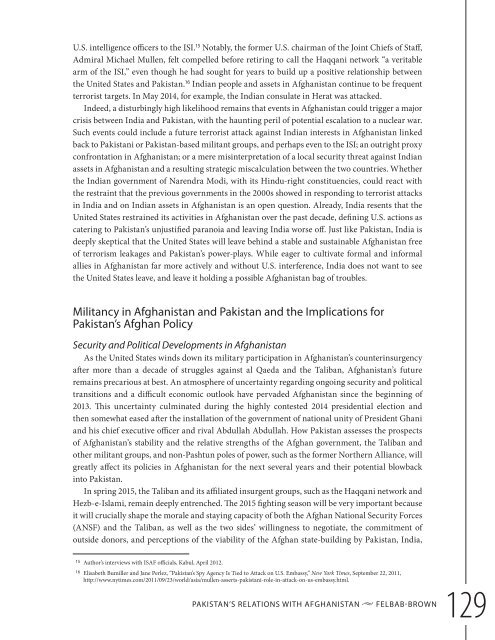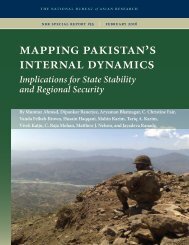pakistan’s
SR55_Mapping_Pakistan_February2016
SR55_Mapping_Pakistan_February2016
You also want an ePaper? Increase the reach of your titles
YUMPU automatically turns print PDFs into web optimized ePapers that Google loves.
U.S. intelligence officers to the ISI. 15 Notably, the former U.S. chairman of the Joint Chiefs of Staff,<br />
Admiral Michael Mullen, felt compelled before retiring to call the Haqqani network “a veritable<br />
arm of the ISI,” even though he had sought for years to build up a positive relationship between<br />
the United States and Pakistan. 16 Indian people and assets in Afghanistan continue to be frequent<br />
terrorist targets. In May 2014, for example, the Indian consulate in Herat was attacked.<br />
Indeed, a disturbingly high likelihood remains that events in Afghanistan could trigger a major<br />
crisis between India and Pakistan, with the haunting peril of potential escalation to a nuclear war.<br />
Such events could include a future terrorist attack against Indian interests in Afghanistan linked<br />
back to Pakistani or Pakistan-based militant groups, and perhaps even to the ISI; an outright proxy<br />
confrontation in Afghanistan; or a mere misinterpretation of a local security threat against Indian<br />
assets in Afghanistan and a resulting strategic miscalculation between the two countries. Whether<br />
the Indian government of Narendra Modi, with its Hindu-right constituencies, could react with<br />
the restraint that the previous governments in the 2000s showed in responding to terrorist attacks<br />
in India and on Indian assets in Afghanistan is an open question. Already, India resents that the<br />
United States restrained its activities in Afghanistan over the past decade, defining U.S. actions as<br />
catering to Pakistan’s unjustified paranoia and leaving India worse off. Just like Pakistan, India is<br />
deeply skeptical that the United States will leave behind a stable and sustainable Afghanistan free<br />
of terrorism leakages and Pakistan’s power-plays. While eager to cultivate formal and informal<br />
allies in Afghanistan far more actively and without U.S. interference, India does not want to see<br />
the United States leave, and leave it holding a possible Afghanistan bag of troubles.<br />
Militancy in Afghanistan and Pakistan and the Implications for<br />
Pakistan’s Afghan Policy<br />
Security and Political Developments in Afghanistan<br />
As the United States winds down its military participation in Afghanistan’s counterinsurgency<br />
ater more than a decade of struggles against al Qaeda and the Taliban, Afghanistan’s future<br />
remains precarious at best. An atmosphere of uncertainty regarding ongoing security and political<br />
transitions and a difficult economic outlook have pervaded Afghanistan since the beginning of<br />
2013. This uncertainty culminated during the highly contested 2014 presidential election and<br />
then somewhat eased ater the installation of the government of national unity of President Ghani<br />
and his chief executive officer and rival Abdullah Abdullah. How Pakistan assesses the prospects<br />
of Afghanistan’s stability and the relative strengths of the Afghan government, the Taliban and<br />
other militant groups, and non-Pashtun poles of power, such as the former Northern Alliance, will<br />
greatly affect its policies in Afghanistan for the next several years and their potential blowback<br />
into Pakistan.<br />
In spring 2015, the Taliban and its affiliated insurgent groups, such as the Haqqani network and<br />
Hezb-e-Islami, remain deeply entrenched. The 2015 fighting season will be very important because<br />
it will crucially shape the morale and staying capacity of both the Afghan National Security Forces<br />
(ANSF) and the Taliban, as well as the two sides’ willingness to negotiate, the commitment of<br />
outside donors, and perceptions of the viability of the Afghan state-building by Pakistan, India,<br />
15 Author’s interviews with ISAF officials, Kabul, April 2012.<br />
16 Elisabeth Bumiller and Jane Perlez, “Pakistan’s Spy Agency Is Tied to Attack on U.S. Embassy,” New York Times, September 22, 2011,<br />
http://www.nytimes.com/2011/09/23/world/asia/mullen-asserts-pakistani-role-in-attack-on-us-embassy.html.<br />
PAKISTAN’S RELATIONS WITH AFGHANISTAN u FELBAB-BROWN<br />
129



